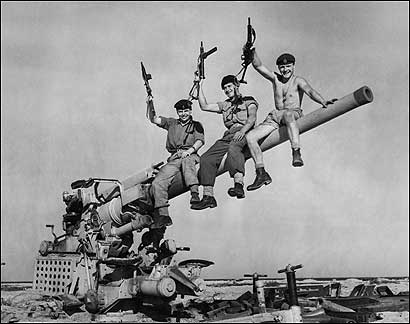Lessons of Suez
Lessons of Suez - The Boston Globe:
Fifty years ago, two western powers conspired to invade an Arab country--in defiance of international law and world opinion. Guess which side the United States was on.

"Once the Suez Canal opened in 1869 (after it had been dug at the cost of at least 100,000 Egyptian lives), it became the lifeline of the British Empire. That was even before it acquired a huge new importance in the 20th century, unforeseen when the canal was planned, as the shipping lane bringing oil from the Persian Gulf to Europe. Even so, and not least during the Second World War, when the British Army fought from Egyptian bases, Egypt was technically independent, under the sybaritic Anglophile King Farouk. But deep nationalist resentment led to an officers' coup under Nasser that overthrew Farouk, and in 1954 the British withdrew from the Canal Zone.
On the principle of ``my enemy's enemy' France and Israel were bound to the British through common hatred of Nasser. The Egyptian leader encouraged the Palestinian resistance, which raided across the border from Egyptian territory, and fomented the nationalist rising in French Algeria. Although the Americans didn't much care for Nasser either, Eisenhower treated him with caution while Nasser, at the height of the Cold War, adroitly played Washington off against Moscow.
After Nasser concluded an arms deal with Russia in 1955, Washington tried to woo him back with a loan for building the Aswan High Dam, but the deal withered. In response, Nasser announced, on July 26, 1956, that he was nationalizing the canal. For London and Paris this was a disaster, much as it might have seemed at the time seem to Washington if the Panama Canal had been seized by a hostile local regime.
Events now moved inexorably. In mid-August a conference was held in London to find a compromise, but the British and French had privately decided that force would likely be necessary, despite Eisenhower, who said (rather like Jacques Chirac on a later occasion) that he was ``determined to exhaust every feasible method of a peaceful settlement.'"

0 Comments:
Post a Comment
Subscribe to Post Comments [Atom]
<< Home